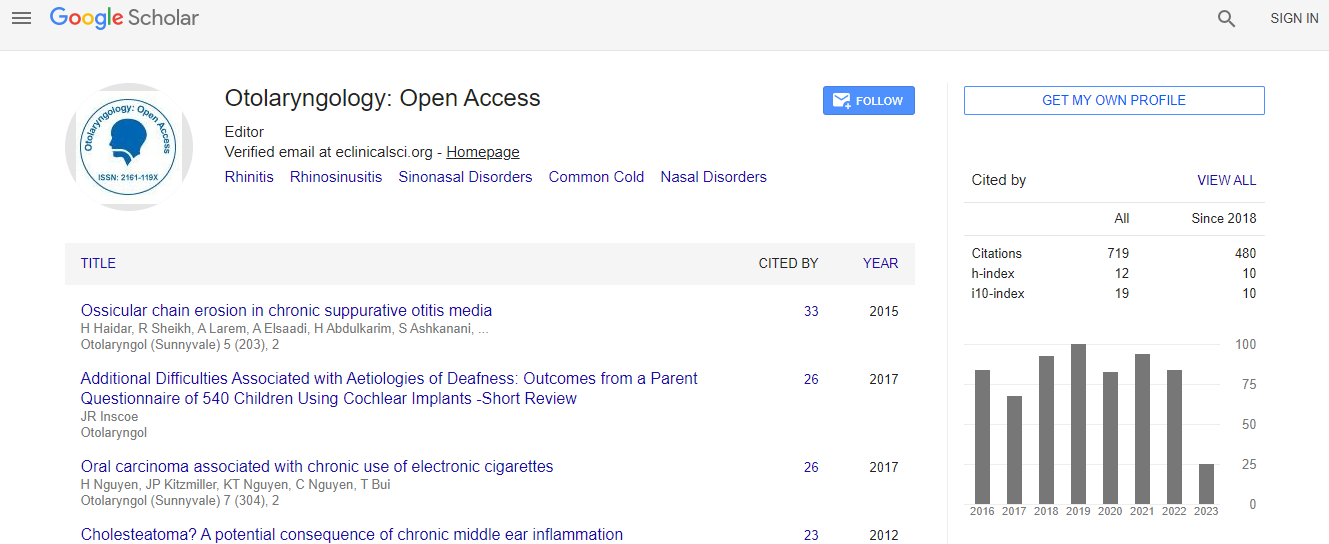Our Group organises 3000+ Global Conferenceseries Events every year across USA, Europe & Asia with support from 1000 more scientific Societies and Publishes 700+ Open Access Journals which contains over 50000 eminent personalities, reputed scientists as editorial board members.
Open Access Journals gaining more Readers and Citations
700 Journals and 15,000,000 Readers Each Journal is getting 25,000+ Readers
Google Scholar citation report
Citations : 925
Otolaryngology: Open Access received 925 citations as per Google Scholar report
Otolaryngology: Open Access peer review process verified at publons
Indexed In
- Index Copernicus
- Google Scholar
- Sherpa Romeo
- Open J Gate
- Genamics JournalSeek
- RefSeek
- Hamdard University
- EBSCO A-Z
- OCLC- WorldCat
- Publons
- Geneva Foundation for Medical Education and Research
- ICMJE
Useful Links
Recommended Journals
Related Subjects
Share This Page
An alternative grading system for ototoxicity in adults: Towards a uniform International standard for grading ototoxicity
3rd International Conference and Exhibition on Rhinology & Otology
Lebogang Ramma
University of Cape Town, South Africa
ScientificTracks Abstracts: Otolaryngology
Abstract
Ototoxicity, defined as a functional impairment and cellular degeneration of the tissues of the inner ear caused by therapeutic agents, is a common adverse event reported following treatment with various compounds such as aminoglycosides and platinum derivatives. Ototoxicity often leads to permanent damage to cochlear and vestibular end organs and may lead to permanent hearing loss. Several criteria have been developed over the years to document ototoxicity-induced hearing loss following treatment with ototoxic medication. However, most of existing criteria have limitations that preclude their use across different contexts; lack of a �common language� used to grade ototoxicity, do not strongly relate to functional outcomes and do not appreciate the effect of ultrahigh frequency hearing loss. We therefore developed an alternative and more clinically relevant grading system (UCT ototoxicity grading scale) for ototoxicity in adults that could be used across patient populations and institutions. In this study, we assessed the feasibility of using this alternative ototoxicity grading criteria as well as compared it to existing ototoxicity grading criteria for adults. The findings of our study showed that the new criteria was easy to use (good interrater reliability, Kappa = 0.87) and showed good agreement with existing ototoxicity grading criteria for adults (UCT versus CTCAEv4, 73.4%; UCT versus TUNE, 78.2%). Given that the UCT ototoxicity grading scale was developed from universally used hearing loss classification systems and it is easy to use, we recommend it for use across different contexts and population groups.Biography
Lebogang Ramma completed his Doctor of Audiology (AuD) degree from the University of Florida, Gainesville, USA and Master of Public Health degree (MPH) from the University of Witwatersrand, Johannesburg, South Africa. He is the current Head of Division, Division of Communication Sciences & Disorders at the University of Cape Town. He has published over 20 papers in reputed journals. He also chaired a Health Professions Council of South Africa’s task team that developed guidelines for monitoring ototoxicity in patients who are on treatment that involves ototoxic medications.
Email: lebogang.ramma@uct.ac.za

 Spanish
Spanish  Chinese
Chinese  Russian
Russian  German
German  French
French  Japanese
Japanese  Portuguese
Portuguese  Hindi
Hindi 
